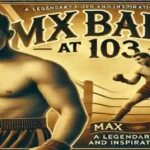In the world of boxing, some fighters make headlines with flashy knockouts, loud personalities, or million-dollar contracts. Others quietly build their legacy with discipline, resilience, and a heart for their community.
Demetris Fenwick belongs to the second group. Born and raised in Sandtown-Winchester, Baltimore, Fenwick is more than just a professional lightweight and super featherweight boxer—he is a mentor, a community leader, and a role model for the city’s youth.
At just 29 years old, Fenwick has already achieved a professional record of 15 wins, 3 losses, and 1 draw (with 4 knockouts).
His journey from the tough streets of Baltimore to professional boxing rings is not only a story of athletic ambition but also one of giving back. Every step of his career reflects his commitment to balancing personal success with social responsibility.
While Fenwick may not yet be a household name in the global boxing scene, in Baltimore, his presence is powerful. He trains at the Upton Boxing Center, works closely with local coaches, and reinvests his fight earnings into youth mentorship programs.
His story proves that success in boxing isn’t just measured in titles and belts, but also in the lives a fighter touches outside the ring. Lets dive more!
Early Life and Family Background
Demetris Fenwick was born and raised in the Sandtown-Winchester neighborhood of Baltimore, Maryland—an area known for both its rich culture and its difficult social challenges.
Growing up in a place where opportunities were scarce and crime rates were high, Fenwick’s childhood was far from easy. Yet, it was this very environment that shaped his resilience and determination to rise above the odds.
His grandmother, Miss Ruby Fenwick, played a crucial role in his upbringing. With love, discipline, and guidance, she became both caretaker and motivator for young Demetris.
She taught him values of hard work, respect, and perseverance—qualities that would later become central to his boxing career.
As a child, Fenwick was energetic and competitive. Like many kids in Baltimore, he found himself surrounded by influences that could have easily led him astray. However, instead of falling victim to the streets, he discovered boxing as an outlet for his energy and emotions.
The sport became more than just an activity; it became a lifeline that kept him focused and away from trouble.
To understand the environment Fenwick grew up in, here’s a quick comparison of Sandtown-Winchester’s realities versus the path boxing offered him:
| Aspect of Life | Sandtown-Winchester Challenges | Boxing’s Positive Impact |
|---|---|---|
| Environment | High crime rates, limited opportunities | Safe space in the gym, structured discipline |
| Guidance | Lack of role models for many kids | Support from coaches and mentors |
| Education/Focus | Distracted youth, high dropout risk | Boxing taught focus, patience, and goal-setting |
| Future Prospects | Many peers caught in cycles of poverty | Boxing offered career and personal growth |
Through his early years, Fenwick learned that every round in life was like a round in the ring—you had to stay on your feet, keep your guard up, and never give in to the challenges.
This mindset, shaped in his childhood, set the foundation for both his career and his community work later in life.
Finding Purpose at Upton Boxing Center
The turning point in Demetris Fenwick’s life came when he walked into the Upton Boxing Center, a local gym that has produced many of Baltimore’s most promising fighters.
For Fenwick, this wasn’t just a place to train—it was a sanctuary, a second home, and the foundation of his future.
Read More: Max Baer at 103: A Legendary Boxer and Inspirational Icon 2025
At Upton, he trained under Coach Kenny Ellis and quickly developed a reputation for his discipline and technical approach.
While many young fighters relied on raw power, Fenwick embraced footwork, timing, and patience. His coaches noted that he absorbed instructions like a sponge, applying lessons from every sparring session.
During his amateur years, Fenwick competed in regional tournaments and gained recognition in events such as the National Junior Olympics and the Golden Gloves.
These competitions not only sharpened his skills but also gave him a taste of what a professional career could look like. More importantly, the structured environment of Upton kept him away from the distractions of street life.
The Upton Boxing Center wasn’t just about punching bags and sparring partners—it also instilled life lessons. The gym emphasized discipline, community, and responsibility, teaching young athletes how to carry themselves outside the ring.
For Fenwick, these values aligned with the principles his grandmother had already instilled in him, making boxing a natural extension of his upbringing.
Here’s a breakdown of Fenwick’s early journey at Upton:
| Stage | Achievements | Impact on Career |
|---|---|---|
| Early Training | Learned orthodox stance, footwork, and defensive techniques | Built technical foundation |
| Amateur Competitions | Competed in Golden Gloves & Junior Olympics | Gained recognition and confidence |
| Mentorship at Upton | Guided by Coach Kenny Ellis and senior boxers | Learned discipline and professional mindset |
| Community Influence | Surrounded by positive role models | Avoided negative street influences |
It was here, between the ropes of Upton’s gym, that Demetris Fenwick transformed from a determined kid into a serious contender. His passion for boxing was no longer just about personal escape—it became a vision of professional success and community impact.
Turning Pro — The Early Years (2015–2019)
After years of preparation at the Upton Boxing Center, Demetris Fenwick finally stepped into the professional ring in 2015, debuting at the Rosecroft Raceway in Maryland.
For any fighter, the transition from amateur to professional boxing is a daunting leap, but for Fenwick, it was the natural next step.
His early professional bouts showed the same qualities he had demonstrated as an amateur—discipline, patience, and a methodical style. Unlike brawlers who sought quick knockouts, Fenwick relied on precision, defense, and timing.
This approach earned him respect from trainers and fans who appreciated his “old-school” style of boxing.
Between 2015 and 2019, Fenwick climbed steadily through regional fight cards. The highlight of this period was his 2019 victory against Miguel Santos, a tough opponent who pushed him to showcase his resilience and adaptability.
This win not only boosted his reputation but also earned him a chance at an IBF regional title, proving that he could compete at higher levels of the sport.
Despite some setbacks, including close fights and one early-career loss, Fenwick never allowed defeat to define him.
Each challenge was a lesson, a reminder that boxing was as much about mental strength as physical ability. His record began to reflect not just numbers, but the story of a fighter learning and evolving.
Here’s a snapshot of his early professional timeline:
| Year | Event | Result/Outcome | Significance |
|---|---|---|---|
| 2015 | Pro debut at Rosecroft Raceway | Win | Start of professional career |
| 2016–2018 | Series of regional fights | Mixed wins and challenges | Built experience & fan base |
| 2019 | Fight vs. Miguel Santos | Victory | Signature win, career highlight |
| 2019 | IBF Regional Title Shot | Competitive performance | Showed potential at higher level |
This period was more than just about building a record—it was about proving to himself and others that he belonged in the professional boxing world. Every fight added to his skillset, his confidence, and his vision for the future.
Style, Strategy, and Training Philosophy
Every boxer has a unique style, shaped by their personality, coaches, and early influences. For Demetris Fenwick, his approach to boxing is built on discipline, defense, and precision.
He fights with an orthodox stance and a 68-inch reach, relying on fundamentals rather than showmanship.
Fenwick is not known for chasing highlight-reel knockouts. Instead, he prefers to wear down opponents with calculated movement, sharp counters, and well-timed combinations.
His footwork-first strategy allows him to control distance, frustrate aggressive fighters, and force opponents into mistakes. This method reflects his belief that boxing is “a thinking man’s game,” where patience often outweighs raw aggression.
A cornerstone of his training philosophy is old-school conditioning. While many fighters focus heavily on modern techniques and flashy routines, Fenwick embraces the basics: running miles on Baltimore’s streets, long sparring sessions, and hours of bag work.
He believes that mental toughness and body endurance are built not by shortcuts but by repetition and persistence.
Here’s a comparison of Fenwick’s approach versus a typical power-focused fighter:
| Aspect | Demetris Fenwick’s Style | Typical Power Fighter’s Style |
|---|---|---|
| Focus | Defense, timing, footwork | Knockouts, aggression |
| Training | Old-school conditioning, repetition | Heavy bag power, strength training |
| Mindset | Patient, tactical, “win the long game” | Quick finishes, explosive rounds |
| Strengths | Technical skill, stamina, adaptability | Raw power, intimidation |
| Weaknesses | Less knockout power, underrated by fans | Vulnerable to tactical boxers |
Fenwick’s strategy sometimes makes him an “underrated” fighter, since fans often celebrate boxers who score big knockouts. However, his consistency and technical sharpness have earned him the respect of coaches and serious boxing analysts.
His style also makes him a valuable sparring partner for other rising talents, as his ability to adapt mirrors the challenges they might face in competitive bouts.
For Fenwick, the philosophy is simple: discipline beats talent when talent lacks discipline. This mantra not only defines his boxing but also reflects his life outside the ring, where he teaches young athletes to stay focused, train hard, and respect the process.
Outside the Ring — Mentoring Baltimore’s Youth
For Demetris Fenwick, boxing is more than a career — it’s a tool to change lives. While many fighters focus only on their next opponent or payday, Fenwick uses his success to uplift the community that raised him.
Every fight purse he earns is reinvested into youth mentorship programs in Baltimore, particularly at the Upton Boxing Center.
His mission is clear: to keep kids off the streets, provide them with a positive environment, and show them that discipline and determination can open doors.
Fenwick understands the temptations and dangers of growing up in Sandtown-Winchester because he lived them. Now, he serves as a role model who proves that a different path is possible.
The program Fenwick supports goes beyond teaching boxing skills. It combines training, academics, and community service, ensuring that young participants grow not just as athletes but as responsible individuals.
The structure is designed to mirror the same values that carried Fenwick through his own challenges.
Here’s a look at the impact of Fenwick’s mentorship efforts:
| Program Component | Description | Impact on Youth |
|---|---|---|
| Boxing Training | Structured classes in fundamentals, defense, and fitness | Builds discipline, confidence, and physical health |
| Academic Support | Tutoring and educational guidance alongside training | Keeps youth focused on school success |
| Life Skills | Teaching respect, responsibility, and time management | Prepares kids for challenges beyond sports |
| Community Service | Encouraging participation in local volunteer projects | Instills pride, accountability, and civic responsibility |
Young boxers who join the program often describe Fenwick as more than a coach. To them, he is a mentor, a big brother, and a guiding hand who listens and supports. Many credit him with keeping them away from negative influences and inspiring them to aim higher in life.
Also Visit: Shocking Baltimore Orioles vs. San Francisco Giants Match Player Stats You Missed
By blending athletic development with personal growth, Fenwick is building something much greater than a boxing legacy. He is shaping the future of Baltimore, one young athlete at a time.
Separating Fact from Rumor
Like many athletes who rise from local fame to broader recognition, Demetris Fenwick has faced his share of rumors and misconceptions.
While his career has been steady, the lack of constant media attention sometimes leads to confusion about his record, background, and goals. To understand Fenwick’s journey clearly, it’s important to separate the facts from the myths.
Some casual fans underestimate him because he isn’t a knockout artist. Others mistakenly inflate or downplay his win–loss record.
There are even misconceptions about his role in the community, with some assuming his mentorship is just a side project rather than a central mission in his life.
Here’s a clear breakdown of common myths versus the truth about Fenwick:
| Rumor/Myth | The Truth |
|---|---|
| “Fenwick is just another journeyman boxer.” | He has a solid 15-3-1 record, fought for an IBF regional title, and continues to climb the ranks. |
| “He only focuses on boxing, not community.” | Fenwick invests every fight purse back into youth mentorship programs at Upton Boxing Center. |
| “He’s all defense and has no power.” | While not a knockout-heavy fighter, Fenwick has 4 KOs and relies on a technical, tactical style. |
| “His community work is for publicity.” | He began mentoring long before gaining wider recognition; for him, it’s personal, not promotional. |
These clarifications show why Demetris Fenwick deserves more attention and respect. His career reflects determination, growth, and purpose. Beyond numbers and rumors, he represents a fighter who balances professional ambition with genuine commitment to his community.
he Man Behind the Gloves
Behind the gloves, the mouthpiece, and the bright lights of the boxing ring, Demetris Fenwick is a man defined by humility, discipline, and heart. While his professional record and community work stand as public achievements, his private life reveals the values that drive him.
Fenwick’s daily routine is simple but disciplined. Mornings usually begin with roadwork — long-distance runs that sharpen his endurance.
Afternoons are spent in training sessions at the Upton Boxing Center, where he not only prepares for fights but also takes time to guide younger boxers. Evenings are often reserved for family, community meetings, or quiet reflection.
Outside of training, Fenwick enjoys spending time with friends and loved ones. Despite the intensity of his profession, those who know him describe him as approachable, soft-spoken, and deeply respectful.
He doesn’t chase fame or spotlight; instead, he focuses on building genuine connections.
His values — respect, discipline, and perseverance — reflect the lessons passed down from his grandmother, Miss Ruby Fenwick, who played such a pivotal role in shaping his character.
These principles guide not just his boxing but also his interactions with everyone around him.
For Fenwick, success isn’t measured by wealth or titles alone. Instead, it’s measured by the impact he leaves behind.
Whether that means mentoring a teenager who chooses the gym over the streets, or inspiring a young fighter to pursue education alongside sports, his legacy is as much about people as it is about boxing.
In many ways, Demetris Fenwick represents the kind of fighter every community hopes to produce — someone who carries himself with pride, uses his platform for good, and never forgets where he came from.
What’s Next — Career Trajectory & Program Expansion
As Demetris Fenwick continues to grow in his boxing career, the future looks promising both inside and outside the ring. His professional record already speaks to his resilience, but what truly sets him apart is his determination to balance sports excellence with social impact.
Boxing Career Goals
Fenwick’s short-term goals include competing in larger venues and gaining exposure on televised fight cards. His long-term ambition is to earn a championship opportunity — a goal well within reach given his steady improvement and disciplined training.
Coaches at Upton Boxing Center believe he has the technical skills and mental toughness required to compete at higher levels.
Community Program Expansion
Parallel to his boxing journey, Fenwick aims to expand his community outreach programs.
Currently focused on mentoring young athletes and providing safe training spaces, he plans to scale these efforts by collaborating with local schools, nonprofit organizations, and youth initiatives.
The vision is clear: to create a pipeline where young people not only train in boxing but also receive guidance in education, career planning, and personal development.
Here’s a look at Fenwick’s dual-track goals:
| Focus Area | Current Status | Future Plans |
|---|---|---|
| Boxing Career | Active pro with growing record at Upton Boxing Center | Compete in national-level fights and aim for title contention |
| Youth Mentorship | Mentors kids in local gym and neighborhood | Expand into structured mentorship programs with schools and nonprofits |
| Community Outreach | Local workshops and small-scale events | Launch wider initiatives promoting fitness, education, and anti-violence efforts |
| Personal Growth | Balances training with family and community commitments | Strengthen public speaking, leadership, and advocacy on youth empowerment issues |
A Future Beyond the Ring
Fenwick understands that a boxing career, no matter how successful, has a limited lifespan. This is why his investment in community building is so crucial. By laying the groundwork now, he’s ensuring that his influence will continue to shape lives long after he hangs up the gloves.
He envisions opening a full-fledged training and education center — a safe haven for youth where boxing is the entry point, but life skills are the ultimate takeaway. In his words, “If I can keep one kid off the streets and give him a fighting chance at life, I’ve already won.”
Conclusion & Legacy
Demetris Fenwick’s story is not just about boxing — it is about resilience, discipline, and the power of giving back.
From humble beginnings shaped by his grandmother’s guidance to becoming a symbol of hope at the Upton Boxing Center, Fenwick has shown that true champions fight for more than just titles.
Inside the ring, he has proven himself with every jab, hook, and defensive move, but outside the ring, his greatest victories are the lives he has touched.
His work mentoring young athletes and building community programs reflects a vision much bigger than personal glory.
Fenwick wants to ensure that the next generation has opportunities, guidance, and hope — things he knows can change the entire course of a young person’s life.
His journey is still unfolding, with big fights ahead and bigger dreams in the community. But what makes him stand out is his ability to balance both — the fighter and the mentor, the athlete and the role model.
If his past is any indication of his future, then Demetris Fenwick’s legacy will not only be written in boxing records but in the hearts of the people whose lives he inspires.
In the end, he is more than a boxer; he is proof that determination, discipline, and compassion can transform both a career and a community.
FAQs about Demetris Fenwick
Who is Demetris Fenwick?
Demetris Fenwick is a professional boxer and community leader based in Baltimore. Trained at the Upton Boxing Center, he has built a reputation for both his skill in the ring and his dedication to youth mentorship and community development.
Where does Demetris Fenwick train?
Fenwick trains at the renowned Upton Boxing Center in Baltimore, a gym known for producing top-tier fighters while serving as a safe space for young athletes to grow, learn discipline, and stay off the streets.
What makes Demetris Fenwick unique as a boxer?
What sets Fenwick apart is his balance between athletic ambition and social responsibility. While many fighters focus solely on championships, Fenwick invests equally in building youth programs, mentoring teenagers, and giving back to his community.
Has Demetris Fenwick won any championships yet?
As of now, Fenwick is still climbing the professional ranks and focusing on sharpening his skills. His coaches believe he has the potential to compete for titles in the near future. His journey reflects patience, discipline, and long-term vision.
What are Demetris Fenwick’s community initiatives?
Fenwick is deeply involved in youth mentorship, fitness programs, and anti-violence campaigns. He regularly works with young people at Upton Boxing Center and is planning to expand these efforts into structured educational and mentorship programs.
What are Demetris Fenwick’s future goals?
His goals include competing at higher levels in professional boxing, expanding his youth outreach programs, and eventually opening a training and education center that combines sports with life skills development.
How can fans support Demetris Fenwick?
Fans can support him by attending his fights, following his career updates on social media, and contributing to his community programs. Supporting local gyms like Upton Boxing Center also helps continue his mission of empowering the next generation.












